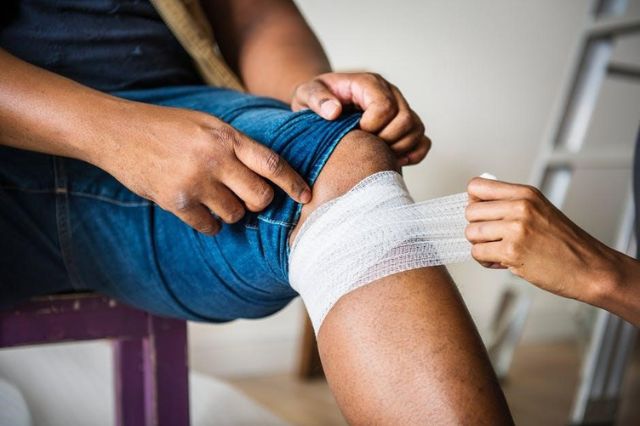The Clear Path to Wellness: Avoiding Health Complications Post-Injury

Injuries are a common occurrence in everyday life and can happen to anyone, anytime. Whether it’s a minor sprain or a major fracture, injuries often require time and patience for recovery. While physical rehabilitation is the obvious route to healing after an injury, what many people tend to overlook is the importance of taking care of one’s overall health during the recovery process.
Neglecting proper self-care and wellness practices post-injury can lead to a myriad of health complications that can prolong or even worsen your road to recovery. Let’s explore how prioritizing your well-being alongside physical rehabilitation can be a game-changer in avoiding health complications after an injury.
Personal Injury Lawyer
Sustaining a personal injury can potentially be a traumatic experience, leading to painful physical, emotional, and financial consequences. In situations like these, seeking local professional legal guidance from a Michigan personal injury lawyer can alleviate the financial burdens of medical expenses and lost wages, as well as ensure that you receive the necessary compensation for your recovery.
Personal injury lawyers specialize in representing individuals who have been injured due to someone else’s negligence, and their expertise can be instrumental in securing a fair settlement for your case.
Nutrition
Post-injury nutrition is a significant part of the recovery process, often overlooked in the hustle of medical treatments and legal procedures. A nutrient-dense, balanced diet expedites the healing process, rebuilds tissues, and boosts the immune system.
It’s advisable to incorporate foods rich in proteins, vitamins, and minerals, such as lean meats, legumes, fruits, and vegetables. On the other hand, avoiding processed foods, sugars, and excessive caffeine can prevent inflammation and sluggishness.
If you make mindful dietary choices, you can create an environment conducive to healing, and mitigate the risk of further complications. Consulting with a registered dietitian can provide tailored nutritional advice, further fostering your journey towards recovery.
Hydration
Adequate fluid intake maintains body temperature, lubricates joints, and transports nutrients to assist in the healing process. It also aids in flushing out toxins and reducing the risk of urinary tract infections or kidney stones, which can potentially arise from certain medications.
Particularly after an injury, dehydration can lead to fatigue, headaches, and slowed recovery. Therefore, it’s essential to consume an ample amount of fluids, not just in the form of water but also from hydrating foods and beverages, like fruits, vegetables, and herbal teas. However, avoid excessive consumption of alcohol and caffeinated drinks as they can lead to dehydration. It’s always a good idea to consult with a healthcare professional for personalized hydration guidelines based on your specific needs and lifestyle.
Mental Well-being
The impact of an injury often extends beyond physical pain, potentially leading to feelings of stress, anxiety, and depression. These mental health challenges can significantly slow down the healing process and negatively influence your quality of life.
During this time, you should seek support: you might consider therapy or counseling, mindfulness practices, and relaxation techniques to manage such feelings. Additionally, maintaining a positive mindset, staying connected with loved ones, and engaging in enjoyable activities can contribute to mental wellness.
Adequate Rest
Most importantly, you cannot achieve optimal recovery without adequate rest: it allows the body to repair and regenerate damaged tissues and replenish energy levels. Adequate sleep contributes significantly to the body’s healing process as it is during these resting periods that the body repairs damaged tissues.
Similarly, overexertion can lead to fatigue and prolonged healing times, so it’s essential to listen to your body’s signals for rest. Incorporating short, frequent breaks throughout the day can also help in replenishing energy levels. At the end of the day, you must find the right balance between rest and physical activity to achieve overall wellness post-injury.
Regular Check-ups
Regular check-ups ensure your recovery is progressing as expected. These visits provide an opportunity to monitor your healing process, adjust treatment plans, and address any concerns or complications that may arise. It’s important to be proactive and honest about your symptoms and the impact on your daily life during these appointments.
Regular communication with your healthcare provider can also manage any side effects from medications or treatments. Never hesitate to ask questions and ensure you fully understand your doctor’s recommendations for a successful recovery.
Avoiding Overexertion
While it’s important not to remain completely idle during recovery, it’s equally vital to avoid overexerting your body. Overexertion can potentially exacerbate your injury, prolong the recovery period, or even lead to new injuries.
Understand and respect your body’s limitations during this time. Gradual reintroduction of physical activity, based on guidance from a physical therapist or doctor, can ensure a safe recovery. Activities such as gentle stretching, light walking, or specific therapeutic exercises can maintain muscle strength and flexibility without straining your body. Listen to your body and do not push beyond discomfort. The goal is not to rush your recovery but to promote healing in a balanced, sustainable manner.
Supplements
When supporting bone health, supplements like vitamin D and calcium are often recommended. These supplements can help with bone healing, especially after an injury or surgery. But before you start taking any new supplement, you must speak with your healthcare provider. They can help you determine the appropriate dosage and whether or not these supplements are right for your specific needs.
Supplements can also be beneficial in managing inflammation and pain. For example, taking omega-3 fatty acids can reduce inflammation while turmeric supplements can provide natural pain relief. Again, always consult with your healthcare provider before incorporating any new supplements into your routine.
Physical Therapy
Physical therapy restores movement reduces pain, and promotes overall function and fitness. Licensed physical therapists are skilled in devising personalized exercise programs tailored to the individual’s specific injury and recovery goals. These programs often combine strength training, stretching exercises, and low-impact cardio activities to gradually return the patient to an optimal level of function.
Physical therapists employ techniques like manual therapy and modalities such as therapeutic ultrasound or electrical stimulation to manage pain and inflammation. Regular physical therapy sessions can prevent future injuries, improve balance and coordination, and ultimately accelerate the healing process.

Your journey to recovery extends beyond physical healing, encompassing sound nutrition, adequate hydration, a healthy mindset, ample rest, regular medical check-ups, careful management of physical activity, and professional guidance in areas such as legal matters and physical therapy.
Always remember that each individual’s recovery process is unique, and don’t forget to listen to your body and respect its pace. With patience, perseverance, and the right care, you can navigate the road to recovery successfully and return to your optimal state of health.




